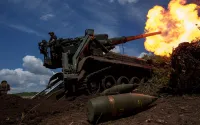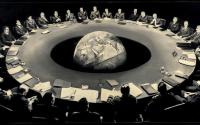16 August 2006The Independent
The Sri Lankan government has defied growing condemnation and declared that it considered children and young people killed in an air strike to be combatants and legitimate targets.
"If the children are terrorists, what can we do?" said a military spokesman, Brigadier Athula Jayawardana.
The government claimed that children killed and injured in the bombing on Monday were child soldiers conscripted by the Tamil Tiger rebels.
The United Nations children's organisation, Unicef, condemned the air strike as "shocking" in a statement issued in Geneva and New York. Unicef's head, Ann Veneman, said: "These children are innocent victims of violence."
The Tamil Tigers are known to use conscripted child soldiers. But Unicef said its information indicated that those killed in the air strike were schoolchildren attending a first aid course. And there was international concern yesterday at the government's statement that it was prepared to target and kill child soldiers.
The full details of what happened in Monday's air strike near Mullaitivu remain confused. The area where it took place is largely cut off from the rest of Sri Lanka by the fighting. But what is clear is that a large number of children and young people were hit. Unicef staff who were allowed to reach the site saw more than 100 people between the ages of 16 and 18 being treated in hospital, many of them critical.
It is also clear that there were deaths. Members of the European ceasefire monitoring mission were also allowed to visit the site, and they saw 19 bodies aged between 17 and 20, according to Thorfinnur Omarsson, the monitor's spokesman.
"Even it is a 17-year-old child in terms of age, they are soldiers who are prepared to kill whoever comes in front of them," Keheliya Rambukwella, a Sri Lankan government defence spokesman, said yesterday. " Therefore the age or the gender is not what is important."
The Tamil Tigers said that 61 schoolgirls were killed in the air strike, but no one has been able to confirm that figure.
The Tigers initially claimed that the air strike had targeted an orphanage, but it has emerged that all the orphans had earlier been moved to another site.
The Sri Lankan government yesterday said that what it hit was a Tiger military base, showing journalists what it said were aerial photographs of firing ranges and weapons stores at the site.
The European monitors said they saw "no evidence of a military installation" during their visit. Unicef says its information is that the compound was being used for a first aid course, and that children from schools nearby were staying overnight for the two-day course.
Unicef estimates that the Tigers currently have 1,300 child soldiers in their ranks, with an average age of 16 a practice Unicef has been working to make the Tigers end. "For us it's not a question of intention," says Dr Haque of Unicef. "What matters is that children are being affected. A child soldier can be any child with a military, whether he or she is peeling potatoes for the soldiers to eat or carrying arms. The responsibility is with both sides to take measures to ensure children are not affected."
Schools were ordered to be closed in government-controlled areas for two weeks for fear of retaliatory attacks on children after a known Tiger front group threatened to target civilians in revenge for the air strike. Fighting continued around the Jaffna peninsula in the north yesterday.
Norwegian mediators have been working without success to persuade both sides to return to a 2002 ceasefire.
The current fighting began when the government launched a ground offensive near Trincomalee, saying it was intended to force the Tigers to reopen a vital water supply they had closed.
But the Tigers have succeeded in spreading the fighting to the Jaffna area, scene of some of the worst battles of the civil war.






